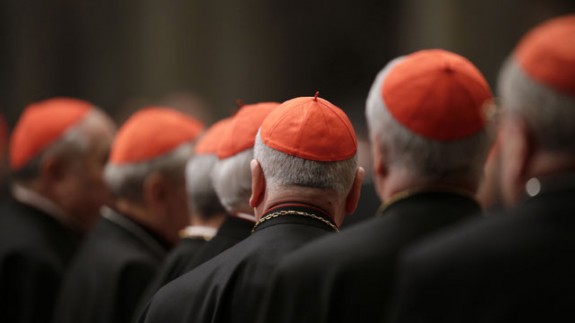Ann Rodgers of the Pittsburgh Post-Gazette gives some welcome perspective on what is unfolding in Rome this week:
As the world awaits a new pope, polls are taken, essays written and hopes expressed for what he might change. Priestly celibacy? Contraception? The working language of the Vatican Press Office?
The latter would be most feasible, but probably would likely involve a tough internal political battle for the new pontiff and his aides. There are theological and logistical limits on the changes he can make. He can’t create new doctrine out of thin air.
“Popes are servants of the church’s settled tradition, not the tradition’s masters,” said papal biographer George Weigel, senior fellow at the Ethics and Public Policy Center in Washington, D.C.
While the pope has authority to govern the church, he must answer to its doctrine as a president answers to the Constitution, said Edward Peters, canon law professor at Sacred Heart Major Seminary in Detroit.
“There are an awful lot of things he’s in charge of, but he’s not free to change a doctrine of the church or to alter the fundamental structure of things like the papacy,” he said.
Some changes that laity say they want from a new pope may involve media-based misconceptions. A 2012 poll from the Public Religion Research Institute found that 60 percent of American Catholics want the church’s public policy statements to focus more on the obligation to help the poor, even if that means speaking less about abortion.
However, regular reading of the Vatican’s daily bulletin shows a church that cumulatively speaks far more often on hunger, poverty, violence, human rights, immigration, the environment and even traffic safety than it does against abortion. But usually only the statements on abortion grab headlines…
…Contrary to popular opinion, infallible statements by popes are extremely rare, but many that carry lesser authority still can’t be easily revised. Most doctrines that the church deems infallible, such as physical resurrection of Jesus, are rooted in Scripture and the creeds — and don’t need a pope to declare them infallible. Those can’t be tampered with either.
“There are limits to the papacy. He’s not God, after all,” said the Rev. Francis Sullivan, 90, a Jesuit who taught theology for 36 years at the Pontifical Gregorian University in Rome. As Pope Benedict told some priests in 2008, “The pope is not an oracle; he is infallible in very rare situations.”
UPDATE: Cardinal Dolan has more from his blog:
A …common misperception is that a new Pope can “change doctrine.” That, of course, is impossible. Catholicism is a revealed religion, meaning we believe that God has told us about Himself and about the meaning of life, primarily by sending us His Son as the “Word made flesh.”
To preserve this truth, to “pass on” the faith to our children, is at the very essence of the Church, and the “job description” of the Pope. He cannot change the deposit of faith.
Some have the impression that we are electing a man who has a “platform,” who can decide new “policies” for the Church. We are not.
Yes, a new Pope can develop fresh, new strategies to better, and more effectively, teach the doctrines of the faith. In fact, this is a big part of what we call the New Evangelization: to express the timeless truths of the faith – – especially the message and mystery of the Person who called himself the Truth, Jesus – – in a timely, radiant, more compelling way.
Remember the way Good Pope John explained it on the eve of the opening of the Second Vatican Council? The faith of the Church is a gift that cannot be altered, he remarked. But, the way this gift is “wrapped” can! That is always a challenge for a Pope.
In other words, the how of our teaching can change; the what of it cannot.
Because, as Billy Graham used to say, the aim of life is to change our lives to conform to God’s will, not to change God’s will to match ours. We let God re-create us in His image; we do not attempt to create God in our image!
Finally, some tease me that we are here to elect a “new boss.” Yes, while I look forward to pledging my obedience to our new Holy Father, I also recognize that his ancient title is “servant of the servants of God.” Following Jesus, he will be elected to serve, not to be served.
And, he will hardly be a “boss” who tells us what to do, but a shepherd who invites us to walk with him on a journey to eternal life in company with Jesus and His Church. As Blessed John Paul II observed, “The Church proposes, not imposes.”
















